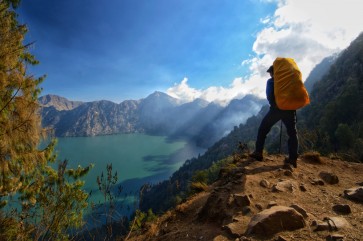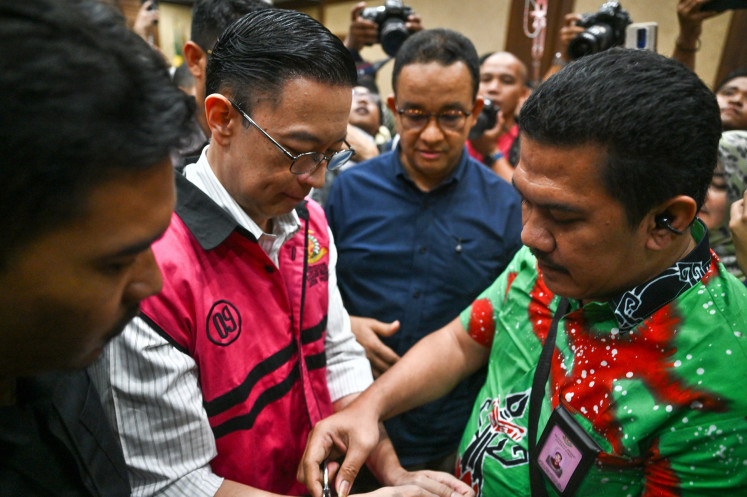Popular Reads
Top Results
Can't find what you're looking for?
View all search resultsPopular Reads
Top Results
Can't find what you're looking for?
View all search resultsBringing global conservation governance to the field
The International Union for Conservation of Nature (IUCN) recently concluded the fifth IUCN Asia Regional Conservation Forum (IUCN Asia RCF) in Incheon, South Korea
Change text size
Gift Premium Articles
to Anyone
T
he International Union for Conservation of Nature (IUCN) recently concluded the fifth IUCN Asia Regional Conservation Forum (IUCN Asia RCF) in Incheon, South Korea.
The IUCN holds The Regional Conservation Forum every four years before the IUCN’s World Conservation Congress (WCC). The next WCC is set to be held in Jeju, Republic of Korea from Sept. 6 to 15, 2012.
The IUCN is the world’s oldest and largest global environmental network. It is unique because its members include governments, NGOs and scientists. Representatives come from more than 160 countries.
The IUCN seeks to find pragmatic solutions to environmental and development challenges. It supports scientific research, manages field projects all over the world and brings governments, NGOs, United Nations agencies, companies and local communities together to formulate and implement policies and laws based on best practices.
The IUCN Asia Regional Conservation Forum, themed “Greening Asia’s Growth”, discussed the draft IUCN Program 2013-2016 Nature + and set up the WCC agenda for 2012.
During the opening session most participants highlighted issues of biodiversity and climate change and reconsidered the existing strategy of energy use by not only searching for alternatives, but also considering means of reducing consumption.
Envisioning a world that values nature conservation, the IUCN Program 2013-2016 has set out a strategy consisting of two core program areas and three thematic program areas.
The two core program areas being proposed deal with conserving biodiversity and sharing the benefits of nature fairly and equitably. It is expected that the two core programs can influence policy development and implementation. The programs intend to provide inputs for better biodiversity governance.
The proposed thematic program areas include nature-based solutions to climate change, managing ecosystems to improve food security and “greening” the economy. Work under the thematic program areas would use tools and standards which take their policy mandate from the core program areas.
Intersection of the programs is expected to provide tools and standards to address key biodiversity issues related to climate change, food security and economic development.
In its implementation, the IUCN encourages participation of all stakeholders in influencing policies and action in sectors that presently do not prioritize nature.
With this four year program, the IUCN has stressed the importance of an approach where members, commissions and the secretariat work together to ensure knowledge sharing and services to support biodiversity and sustainable development.
On global conservation issues, WCPA Asia addresses key protected area issues, population density, coverage of protection of land, wetlands, and the marine environment, as well as tourism.
In order to capably address key issues, WCPA Asia has been working on harmonizing WCPA’s regional structure with the IUCN Secretariat to geographically align their Asia program. Asia is a unique region given its social and cultural diversity as well as extraordinary wildlife and ecosystems.
The unique diversity in the Asian region leads to both challenges and opportunities in addressing biodiversity concerns.
In formulating the WCPA Asia Program, a steering committee was established in 2009 and held its first meeting in Bangkok.
The committee’s first meeting brought together regional experts to discuss challenges and opportunities and share experiences and information on protected area management across the region.
The main areas addressed during the first meeting were climate change, landscape connectivity and governance reform.
Following the formalization of the regional structure, WCPA Asia has developed a strategic plan where the main focus of the IUCN in Asia is to build recognition based on sound science to support livelihoods, especially for the poor, based on sustainable management of natural resources.
Bringing global conservation direction to Indonesia, as member of the IUCN, has a strategic role in its bid to preserve biodiversity, sustain development and mitigate impacts of climate change.
According to the IUCN, Indonesia is one of the world’s seven richest countries in terms of biodiversity.
It is home to 10 percent of the world’s flowering plants, 12 percent of the world’s mammals and 17 percent of the world’s reptiles, amphibians and birds.
Despite its potential, Indonesia is faced with significant challenges due to development of palm oil plantations, encroachment of industrial plantations and forest fires. Forest law enforcement and governance are also among the major challenges Indonesia has to deal with.
Learning from global trends in addressing issues concerning biodiversity, Indonesia should prioritize improving governance in order to support effective environmental management, increase stakeholder participation, dedicate further resources through incentives for developing ecotourism in protected areas (such as national parks), enhance capacity building for forest managers, increase the number of forest rangers, promote public awareness and partner with local NGOs and international organizations to address climate change.
As a large country, Indonesia should also ensure effective laws are put in place to avoid illegal logging and deforestation.
In addition to those key areas, the government should also reconfirm its commitment to protecting the environment by exploring possibilities to increase sustainable use of the country’s natural resources.
Conservation is not only about preserving and protecting, but also utilizing resources sustainably based on definitive management objectives.
The writer is pursuing his doctorate at the Department of Forest Science, Seoul National University, South Korea.










